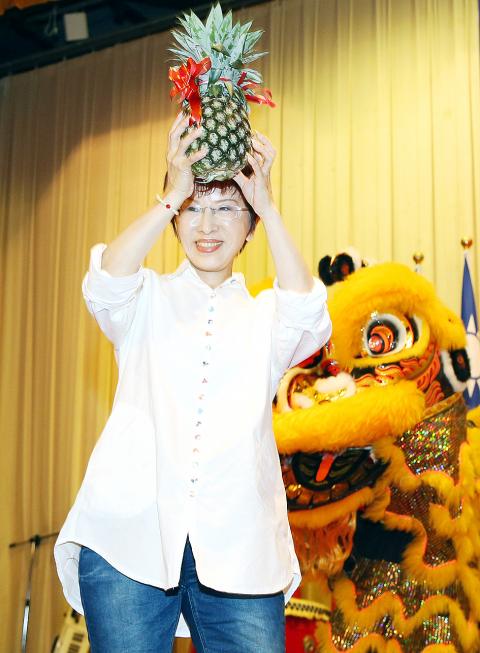Chinese Nationalist Party (KMT) presidential candidate Hung Hsiu-chu (洪秀柱) yesterday said she would never give up her bid for the presidency and promised to fight for her beliefs until the end, concluding a surprise three-day hiatus in campaigning that sparked speculation she was considering throwing in the towel.
Speaking at a news conference in Taipei, Hung said she would continue to be brave and outspoken despite the tough challenges that lie ahead, adding she hoped that “all the rumors and speculation will end here.”
Hung said she has always considered her main rival to be Democratic Progressive Party presidential candidate Tsai Ing-wen (蔡英文).

Photo: CNA
Some polls have indicated that if People First Party Chairman James Soong (宋楚瑜) were to become Hung’s running mate, she might have a chance of defeating Tsai, who the majority of polls say is backed by 40 percent of the electorate.
“With a woman’s selflessness and kindness, I look to end populism and political wrangling between the pan-blue and pan-green camps in the presidential election against Tsai,” Hung said.
“Taiwan is really sick,” she said, adding that the inherent kindness of Taiwanese “disappears” whenever politics is concerned, and the public should unite to build a society based on trust.
Hung said the root of the illness is in politics and “especially we who are in politics,” because politicians have set “a very bad example” for the public.
A lot of politicians do not know what “integrity” means and go so far as to deny its existence, Hung said, asking: “Why does society condone this?”
The “shameless remarks” of former president Lee Teng-hui (李登輝) have betrayed Taiwan, but he still has the support of the pan-green camp, Hung said, apparently referring to Lee’s statement that the Diaoyutai Islands (釣魚台) — which Taiwan also claims — belong to Japan.
Hung said Tsai and Soong are Lee’s heirs apparent, as both went to Lee’s 90th birthday celebration.
The nation’s politics have been held hostage by populism, while the voice of reason is getting weaker, she said.
The public has either opted to “fight [against China],” or “drag its feet” on cross-strait relations, and does not want to seriously address the reality of the relationship that is so crucial to the future of Taiwan, she said.
Next year’s Jan. 16 presidential election represents a choice between the “integrity versus hypocrisy” of the nation’s leader, “rationality and populism” with regard to domestic policy and “peace and avoidance” over cross-strait ties, she said.
Hung also elaborated on her remarks about the defeatism that she said has permeated the KMT, which she attributed to the demoralizing effect of the party’s drubbing in the nine-in-one local elections in November last year.
Although some in the KMT might think she is not one of the party’s heavyweights, she said would “fight for my faith to the end.”
Ethical politicians should become the norm once again and she wants to transform the party so that the public can regain its trust in it, she said.

CHAOS: Iranians took to the streets playing celebratory music after reports of Khamenei’s death on Saturday, while mourners also gathered in Tehran yesterday Iranian Supreme Leader Ayatollah Ali Khamenei was killed in a major attack on Iran launched by Israel and the US, throwing the future of the Islamic republic into doubt and raising the risk of regional instability. Iranian state television and the state-run IRNA news agency announced the 86-year-old’s death early yesterday. US President Donald Trump said it gave Iranians their “greatest chance” to “take back” their country. The announcements came after a joint US and Israeli aerial bombardment that targeted Iranian military and governmental sites. Trump said the “heavy and pinpoint bombing” would continue through the week or as long

TRUST: The KMT said it respected the US’ timing and considerations, and hoped it would continue to honor its commitments to helping Taiwan bolster its defenses and deterrence US President Donald Trump is delaying a multibillion-dollar arms sale to Taiwan to ensure his visit to Beijing is successful, a New York Times report said. The weapons sales package has stalled in the US Department of State, the report said, citing US officials it did not identify. The White House has told agencies not to push forward ahead of Trump’s meeting with Chinese President Xi Jinping (習近平), it said. The two last month held a phone call to discuss trade and geopolitical flashpoints ahead of the summit. Xi raised the Taiwan issue and urged the US to handle arms sales to

BIG SPENDERS: Foreign investors bought the most Taiwan equities since 2005, signaling confidence that an AI boom would continue to benefit chipmakers Taiwan Semiconductor Manufacturing Co’s (TSMC, 台積電) market capitalization swelled to US$2 trillion for the first time following a 4.25 percent rally in its American depositary receipts (ADR) overnight, putting the world’s biggest contract chipmaker sixth on the list of the world’s biggest companies by market capitalization, just behind Amazon.com Inc. The site CompaniesMarketcap.com ranked TSMC ahead of Saudi Aramco and Meta Platforms Inc. The Taiwanese company’s ADRs on Tuesday surged to US$385.75 on the New York Stock Exchange, as strong demand for artificial intelligence (AI) applications led to chip supply constraints and boost revenue growth to record-breaking levels. Each TSMC ADR represents

State-run CPC Corp, Taiwan (CPC, 台灣中油) yesterday said that it had confirmed on Saturday night with its liquefied natural gas (LNG) and crude oil suppliers that shipments are proceeding as scheduled and that domestic supplies remain unaffected. The CPC yesterday announced the gasoline and diesel prices will rise by NT$0.2 and NT$0.4 per liter, respectively, starting Monday, citing Middle East tensions and blizzards in the eastern United States. CPC also iterated it has been reducing the proportion of crude oil imports from the Middle East and diversifying its supply sources in the past few years in response to geopolitical risks, expanding